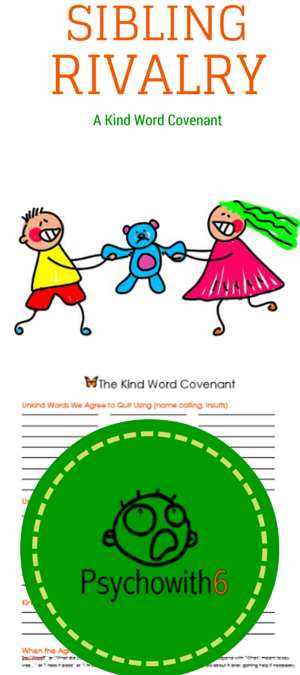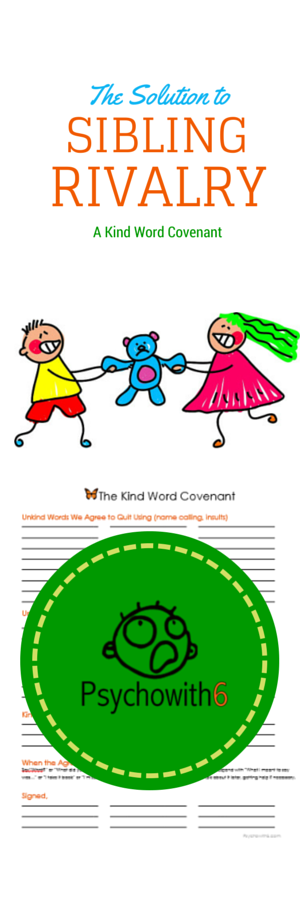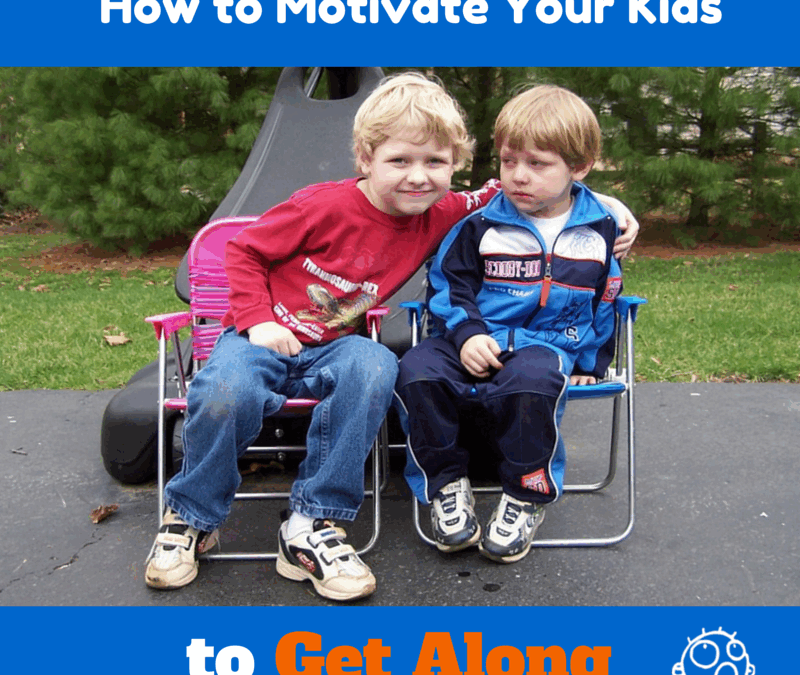
The Solution for Sibling Rivalry
 The fighting and bickering gets on your nerves at best and scares you at worst. What are you supposed to do?
The fighting and bickering gets on your nerves at best and scares you at worst. What are you supposed to do?
I’m a psychologist and I’m supposed to KNOW what to do. I’ve tried just about every recommended technique:
- Ignoring the fighting as a plea for my attention
- Putting the argued-over object into time out
- Putting the fighting kids in a room together until they can work things out
Of course, I have used Scripture to admonish and have disciplined cruel behavior.
But it wasn’t until recently that I realized that I was always trying to battle the blaze, instead of trying to prevent these heated arguments in the first place.
While disagreements over toys and turns with kids are inevitable, there was a source of the conflict that I had neglected to “nip in the bud” as my mom liked to say: unkind words.
Oh sure, I chastised them whenever I heard something unkind being said. But I tolerated it like it wasn’t a big deal. It is.
Why We Have to Nip Unkind Words in the Bud
The Bible says that unkind words are:
- like sword thrusts (Proverbs 12:18)
- likely to stir up anger (Proverbs 15:1)
- likely to cause trouble (Proverbs 21:23)
Before Joseph’s brothers sold him into slavery (and later regretted it), they were unable to say a kind word to him (Genesis 37:4).
Though we frequently hear about the effect of parents’ unkind words on their children, siblings’ cutting words can be just as devastating.
As parents, I believe we have to take unkind words seriously. We wouldn’t allow our children to jab at their siblings with a sword. Neither should we tolerate unkind words.
The Solution to Sibling Rivalry
While we can’t avoid conflict in our families, we can take steps to stop the verbal abuse that is so destructive.
#1 Have a family discussion.
I can’t stress the importance of this enough. You may be astonished as I was at the level of hurt your children are experiencing because of the words that have been said. Depending on your children’s ages, this could be an emotional conversation. Don’t begin unless you have plenty of time and have removed as many distractions as possible.
Start with Scripture. Share the Scriptures above and retell the story of Joseph and his brothers in your own words. Explain that our family members can hurt us more deeply than anyone, because they know us so well.
Use the butterfly metaphor. Ask your children what would happen if you pressed down fairly lightly on a butterfly’s wings. Explain that in the same way that the butterfly could be wounded by something we take lightly, our siblings can be greatly wounded by our words.
Ask them for examples of words that have wounded them. Make sure they know that they are allowed to share words that Mom or Dad have used that have wounded them as well. Clarify that the discussion is not for the purpose of disciplining anyone. Do not allow anyone to question what your children say hurts them (No “I was kidding!” “You’re so sensitive.” “That didn’t hurt you; you laughed!”). You may hear some really upsetting things. Try not to discourage your kids from getting everything out on the table.
Write everything down. I created a form for this purpose which you can get by scrolling to the end of the post. Please feel free to add your own examples of unkind words. Include words that label the person rather than deal with the behavior and words that suggest mind reading. For example, “You’re so selfish!”; “You always…”; “You did that on purpose!”.
Ask them for behaviors that have been hurtful. You may hear the obvious like hitting or taking toys away, but also the less obvious like not being included. Write these down, too. Again, if you have examples of unkind behavior that your children haven’t mentioned, list them.
Ask them for positive words they would like to hear. As with most problems, the solution isn’t exclusive to eliminating bad behavior, but requires the addition of new behaviors. They may have trouble with this one, so make suggestions like:
- “Great job!”
- “I like playing with you.”
- “You’re getting better at that.”
Ask them for positive behaviors they would like to see. In the same way, it’s important to ask them for positive behaviors they need from their siblings, such as:
- Helping with clean up
- Being included in play
- Sharing
#2 Sign the Kind Words Covenant
Explain the purpose of a covenant. A covenant is a serious agreement between two or more parties. God’s covenant with us as believers is based on grace. Whereas before Christ fulfilled the law and died for our sins, we were unable to overcome our sinful nature and treat our siblings lovingly, now we can. The covenant is the beginning of changing our beliefs about the importance of kind words. Although we know we will make mistakes, we agree to pray regularly for Jesus’ ability to abide by the covenant.
Explain what will happen if the covenant is broken. If unkind words are used, the person who hears them (or is the victim of them) will ask, “What?” or “What did you say?” When your children (or even the adults in your home) are still getting used to the covenant, you may have to repeat the questions, remind them they have broken the covenant, or prompt them further to give an appropriate response to these questions which includes: “What I meant to say was…”; “I take it back.”; and “I’m sorry.” If the response is insincere, say so. The point is not to literally repeat the unkind words, but to realize you have violated the covenant and respond appropriately.
If unkind behavior is the problem, anyone who sees it will ask, “What are you doing?” The appropriate responses are to stop the behavior and apologize.
Ask everyone to sign the covenant. Emphasize the seriousness of the signing. A signature means you are committed to using kind words in your family and are willing to respond as described above if you violate the agreement.
#3 Put the Covenant into Practice
Model what to do when the covenant is broken. At the beginning, everyone will look to you as the parent to see if you take the covenant seriously. Be prepared to say “What?” and encourage appropriate responses a lot. If one child says something unkind and is answered in turn, ask both children what they said–with the intent of getting them to respond correctly and not by repeating the unkind words. You may have to add at first that they have broken the covenant. Remind them to respond this way when you are not there to witness the unkind words. Encourage them to walk away or get help if their sibling doesn’t rephrase their words, take it back, or apologize.
Involve your children’s friends. Explain to children who are in your home that you don’t want to hear unkind words and that when they use them, you will be asking, “What?” or “What did you say?” That is their cue to say, “What I meant to say was…” or “I’m sorry.” You may wish to share this post with your friends so all your children can be on the same page. I found that a significant amount of hurt was related to words shared among friends.
Add to the contract as needed. You will keep finding examples of unkind words and behaviors. Add them to the covenant and review it frequently at first.
Talk with unrepentant children. In the beginning, when hurts are still fresh, you may have one child who is so angry that he refuses to abide by the agreement. At these times, you may want to let your child calm down, give consequences, and/or have a private discussion. Perhaps there is more going on in the relationships than has previously been discussed. Sometimes children feel parents aren’t enforcing the rules equally and you need to be open to hearing your child’s perspective.
If your child still refuses to abide by the covenant, ask him what will happen if you give up on it. Does he really want to go back to relationships that have no limits on unkind words and behavior? Pray with your child and ask God to give him His heart for his brothers and sisters.
Every situation is different and you may need professional help in resolving sibling rivalry in your home. Seek your pastor’s counsel or a referral to a Christian counselor.
I am thankful for the practical tips taken from books on verbal abuse by Patricia Evans. You may wish to read her materials for further understanding of the destructiveness of verbal abuse.
This covenant has been an answer to prayer for my family. I hope it is for yours as well.
If you are already a subscriber to Psychowith6, you will find the covenant in the Subscriber Freebies folder (you received the link when you subscribed). Otherwise, you can get your free copy by clicking the button below:
Get the Kind Word Covenant
Want more parenting sanity? Be sure to follow my Christian parenting board on Pinterest.



 This is another question my friend who is new to homeschooling asked: how can you motivate your kids to get along?
This is another question my friend who is new to homeschooling asked: how can you motivate your kids to get along?



